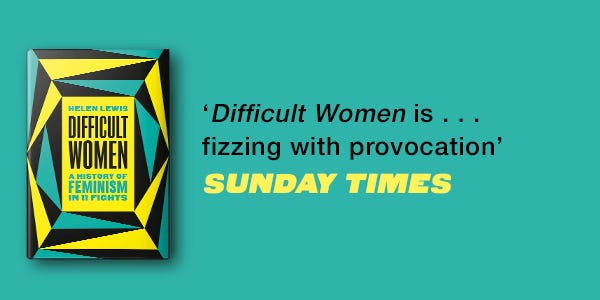Happy Friday!
A short email today, because I deleted the angry rant I originally wrote. It’s been an irritating week: who knew that being vindicated would be so annoying? Well, apart from Jeremy.

The Haunting of Alma (Guardian)
Alma’s days were a repetitive round of domestic chores, relieved only by forays to the shops and cups of tea with friends. She had to dust and polish, to darn, sew and knit, launder and iron, cook meals for her family, sweep hearths and floors, fetch coal and lay fires, scrub pots and pans. British women had enjoyed a spell of freedom during and immediately after the war, when many of them went out to work, but the popular press now encouraged them to keep to the home. They were urged to tend to their appearance (“What men hate about your hair” the Mirror revealed in March) and their family’s health. The Daily Mail warned female readers against having too lively a relationship even with their belongings. “Don’t wear a necklace if you’re tempted to twiddle it,” advised the paper. “Keep your hankie in your bag; it’s not meant to be twisted.” The ideal woman was contained, composed, restrained. But for a woman with psychic powers, different rules applied. A medium could undertake extravagant feats of mobility – astral projection, transfiguration, time travel, levitation – and in doing so escape the constraints of her gender and her class. Alma’s poltergeist not only twiddled necklaces but sprang them from shop counters; it whipped saucers across rooms, upended eiderdowns, spun rings on to fingers. It took gifts to the researchers at the institute, as if to charm or trade its way into their world. . . .The American writer Charles Fort noted that poltergeists often emanated from those who had no direct power – women, servants, adolescents, children.
Black Lives Matter and the Mechanics of Conformity (Quillette)
As likeminded people surround each other, the more resistant they are to discrediting information. Leon Festinger describes this process in When Prophecy Fails, but the most eloquent description comes from Adolf Hitler’s architect and Minister of Armaments Albert Speer, who spent decades in prison after the war attempting to understand how he had allowed himself to become swept up by the delusions of the regime he supported:
… in normal circumstances people who turn their backs on reality are soon set straight by the mockery and criticism of those around them, which makes them aware they have lost credibility. In the Third Reich, there were no such correctives, especially for those who belonged to the upper stratum. On the contrary, every self-deception was multiplied in a hall of distorting mirrors, becoming a repeatedly confirmed picture of a fantastical dream world, which no longer bore any relationship to the grim outside world. In those mirrors I could see nothing but my own face reproduced many times over.
Wow, freaks my nut to learn that Albert Speer invented social media.
Quick Links
“The real political opposition to self-ID came from 'ordinary' women who saw the proposal as a potential threat to their legal rights and standing. Some of them came to the issue via Mumsnet <waves to FWR board>. Others attended townhall meetings of A Woman’s Place UK, a group set up by women with their roots in the trade union movement. This grassroots movement deserves a lot of attention and study.” James Kirkup in The Spectator.
“If his younger years were marked by Booker T. Washington-style ‘uplift’ politics, his college days were spent becoming not only woke but a bit woker than thou. Early in his time at Florida A&M, a historically Black university, he announced he would date only dark-skinned Black women, and even parroted a conspiracy theory that white people were from outer space.” GQ profiles Ibram X. Kendi.
“When ideas are stated clearly, after all, they may be detached from their author: one can take them away and pursue them on one’s own. When they remain mysterious (indeed, when they are not quite asserted), one remains dependent on the originating authority.” Martha Nussbaum on Judith Butler. It’s incredible to me that Nussbaum wrote this in 1999: “The great tragedy in the new feminist theory in America is the loss of a sense of public commitment. In this sense, Butler’s self-involved feminism is extremely American, and it is not surprising that it has caught on here, where successful middle-class people prefer to focus on cultivating the self rather than thinking in a way that helps the material condition of others.”
“In Leeds, Slung Low, a theatre company that takes a radical community-focused approach, [..] has taken on responsibility for social referrals in the Beeston and Holbeck area.s. This involves delivering 150-200 food-bank parcels a week, organising a volunteer response and dealing with requests for support for 7,500 local households.” (Financial Times). This is laudable but surely not a template for the post-pandemic future? It is not clear to me why theatres should aim to be community centres rather than producers of art. Shouldn’t we have actual community centres to fulfil the former role? The skill sets of running a food bank and producing Miss Julie are quite different.
“Reading about the challenges she faced, I thought: if I had to work with this bunch of jokers, I’d bully them too.” Stephen Bush on Left Out and This Land, in a review which is interestingly tough on John McDonnell (New Statesman).
You don’t have to be mad to work here, but iT HeLpS.

See you next week.


